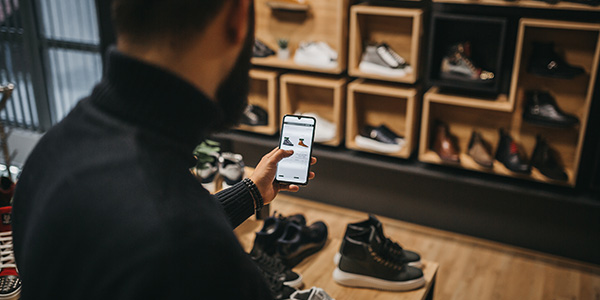In brief
- Technology is central to sustainability within the retail sector through adopting innovations like AI to design circular products, blockchain to increase traceability and web/mobile apps to engage consumers in ethical decision-making
- To increase sales, engagement and brand loyalty, retailers must align products and business practices with evolving customer expectations around sustainability, ensuring promotional claims are supported by trackable data and documented actions
- By evaluating, monitoring and showcasing sustainability, retailers can establish heightened transparency in reporting standards, gaining deeper insights into consumer preferences. Luxoft helps retail businesses grow by embedding sustainable business practices
In recent decades, the retail industry has undergone a profound transformation driven by the convergence of technology and shifting consumer preferences, such as consumers demanding goods and services instantaneously and expecting seamless omnichannel customer service. Consumers are also increasingly taking ethics and sustainability into consideration when making purchases due to ongoing external factors. The rapid accessibility to news and social media has increased awareness of environmental and social concerns, continually informing purchasing decisions. Technology can play a vital role in addressing sustainability within the retail sector through innovations such as blockchain to increase traceability, artificial intelligence to design circular products, and web and mobile apps to engage consumers in ethical decision-making.
Blockchain for transparency and traceability
Companies previously have aimed to pursue sustainability solutions through technology, exemplified by Nike's 2014 'Making' app, aiding designers in assessing environmental impacts. While the lack of technological maturity at the time limited the tool’s capabilities, today's technological strides significantly enhance the ability to address sustainability. The possibilities offered through various technological tools such as blockchain are allowing for companies to elevate transparency and traceability within the operational supply chain as a retailer. Everledger promotes blockchain technology to trace the origin and authenticity of diamonds, ensuring transparency in their journey from mine to market. The company utilizes blockchain to create a "digital passport" for each diamond, capturing various data points like its origin, characteristics and transaction history. This system creates an immutable record, verifying ethical practices and confirming if diamonds come from conflict-free zones. By offering secure and transparent blockchain asset tracking, Everledger helps consumers make informed choices about the diamonds they purchase while addressing concerns about counterfeit stones and unethical sourcing.

AI for forecasting zero waste
Artificial intelligence (AI) has been making sweeping waves in the business world. Specifically, within the retail industry, many companies are utilizing AI in many ways, such as demand forecasting to understand consumer demand in real time and to design a sustainable experience for consumers. Recently Albertsons Companies, one of the largest food and drug retailers in the United States, released their 2023 Environmental, Social and Governance (ESG) Report — in the report they highlighted an emphasis on waste reduction and circularity. The company partnered with Afresh Technologies’ Artificial Intelligence platform to enhance its fresh food forecasting and inventory monitoring, to advance its commitment to reaching the goal of zero food waste going into landfills by 2030. The platform enables grocery stores to calculate their fruit and vegetable orders by analyzing a range of data points, including customer demand at the store level, historical sales data and the perishability of the products. With this technology, Albertsons can reduce food waste while also supplying the consumer with fresh products on a regular basis.
Applications for a more personalized carbon footprint journey
Numerous companies are actively embracing web and mobile applications to create interactive resources aimed at educating and influencing sustainable purchasing decisions. ThredUP, a prominent online resale platform for clothing, footwear, and accessories, is harnessing innovative technologies and data to foster a more sustainable and engaging relationship with their consumers. According to ThredUp’s 2023 resale report, by 2027 the secondhand apparel market will reach $350 billion, and the United States market will grow to $70 billion. In response to the pressing concern of fashion-related pollution, ThredUP introduced the Fashion Footprint Calculator. This tool prompts users to answer questions about their individual shopping behaviors, clothing consumption patterns, and laundering practices to gauge the environmental impact of their wardrobe, specifically the amount of carbon emissions generated each year. ThredUP's innovative use of technology empowers shoppers to gain insights into their shopping habits while fostering a sustainable shopping journey from start to finish.

Unlocking business growth
Innovative technologies provide the opportunity for retail companies to enhance engagement with their customer base through a sustainability framework. Aligning products and business practices with customers’ evolving expectations around sustainability can propel engagement, sales and loyalty. However, customers are savvy, so it is vital to understand their expectations in relation to product and company and ensure that claims are backed by data and actions. Enhancing sustainability practices not only can improve a company’s reputation but can drive cost efficiencies and optimization, foster innovation and contribute to long-term societal impact.

Mastering customer insights
Translating all of these impacts into metrics requires integration with technology and the ability to market a story through data. With accessibility to innovative technology continuing to grow, it is crucial for retail companies to grasp the effective utilization of these tools. The retail landscape is no longer a one-size-fits-all for consumers. With an emphasis on ethical and sustainable transparency as an evolving pillar of the retail experience, understanding the diverse consumer personas and their unique customer journeys is critical to ensuring customer, brand, and product are aligned to drive business impact.
Get started by knowing your customer
By evaluating, monitoring and showcasing sustainability, retail businesses can establish heightened transparency in their reporting standards and design an opportunity to gain deeper insights into consumer preferences. Technology can provide advantages for retail businesses to flourish while embedding sustainable business practices. There is a notable opportunity for retail companies to integrate advanced technologies like blockchain, AI, and consumer engagement apps to address challenges related to transparency and sustainability. However, to benefit from these opportunities, it is important to understand customer experience and expectations to avoid missing the mark. Ultimately, as retail businesses embark on this transformative journey, it all begins with knowing your customer — the key to unlocking sustainable success in the digital age.

Ready to elevate your business with the seamless integration of new technologies? Luxoft’s Smashing Ideas team can help you create a CX-focused strategy that ensures technology adoption aligns perfectly with user expectations to drive satisfaction, loyalty and business impact. Learn more and reach out to us today.








